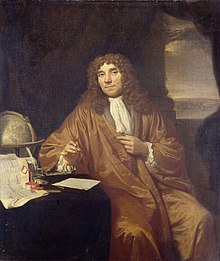Antonie van Leeuwenhoek
| Antonie van Leeuwenhoek | |
|---|---|

A portrait of Antonie van Leeuwenhoek (1632–1723) by Jan Verkolje
|
|
| Born |
24 October 1632 Delft, Dutch Republic |
| Died | 26 August 1723 (aged 90) Delft, Dutch Republic |
| Nationality | Dutch |
| Fields |
Microscopy Microbiology |
| Known for | The first acknowledged microscopist and microbiologist Microscopic discovery of microorganisms (animalcule) |
| Influences |
Robert Hooke Regnier de Graaf |
| Influenced | History of biology and life sciences Natural history Scientific Revolution Age of Reason |
| Signature | |
Antonie Philips van Leeuwenhoek (/ˈleɪvənhʊk/, Dutch: [ɑnˈtoːni vɑn ˈleːuə(n)ˌɦuk]; 24 October 1632 – 26 August 1723) was a Dutch businessman, scientist, and one of the notable representatives in the golden age of Dutch science and technology. A largely self-taught man in science, he is commonly known as "the Father of Microbiology", and often considered to be the first acknowledged microscopist and microbiologist. Van Leeuwenhoek is best known for his pioneering work in the field of microscopy and for his contributions towards the establishment of microbiology as a scientific discipline.
Raised in Delft, in the Dutch Republic, Van Leeuwenhoek worked as a draper in his youth, and founded his own shop in 1654. He made a name for himself in municipal politics, and eventually developed an interest in lensmaking. Using his handcrafted microscopes, he was the first to observe and describe microorganisms, which he originally referred to as animalcules (from Latin animalculum = "tiny animal").
...
Wikipedia
